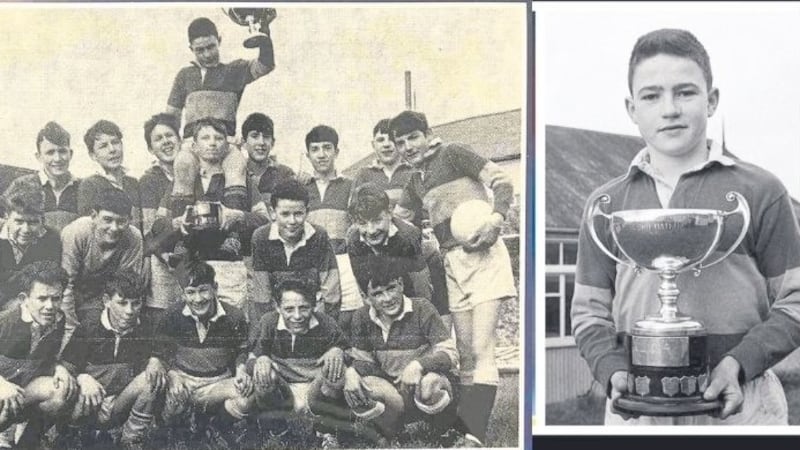The 1970s witnessed some of the most turbulent and distressing years of the Troubles.
Schools and colleges attempted to be havens of sanity and order in the midst of shootings, bombings and the worst form of street violence.
The work of teachers in ensuring that their students were educated in a safe environment and that games and sporting activities continued unabated is one of the most underestimated and unacknowledged issues of this era.
Nowhere was this most clearly evident than on the Antrim and Falls Roads in Belfast which, despite the street violence all about, witnessed the emergence of the two Belfast schools –St Malachy’s College and St Mary’s CBS – make their drive towards successive MacRory and Hogan Cups finals in 1970 and ‘71.
Malachy’s led the way in a bruising 2-6 to 0-6 encounter with St. Michael’s, Enniskillen. Referee Art McRory had the unenviable task of policing this set-to.
The Irish News report labelled the match as ‘a bruising and foul-ridden final that fell flat after a big build-up and produced a game of niggling fouls – on average two per minute – as well as strong robust tackling that at times bordered on dangerous.’
McRory eventually sent off a player from either side, Justin Thompson and Donal Meade. At the final whistle, and for the first time since 1929, it was joy unconfined for Malachy’s when team captain Basil McClean raised aloft the MacRoryCup.
Oozing class and confidence, the Antrim Road side gave an exhilarating display of football in dismissing St Colman’s, Claremorris on their way to a Hogan Cup shootout against Cork’s Colaiste Chriost Rí at Headquarters on April 19.
The match ended in the most agonising way possible for the Belfast college. The scoring exploits of George Adams, Donal Meade, Eugene Grant and the O’Neill brothers, Owen Roe and Martin, all came to nought when a last-gasp goal by right half forward Noel Millar had edged the Cork boys ahead at the final whistle on a score of 4-5 to 1-13.
Martin O’Neill later recalled the devastation of the occasion: “To dominate a match for so long yet loose was hard to take. But to play the type of football we produced on Ireland’s most sacred turf and still end up being beaten bore comparison with the most serious Greek tragedy.
“A mortal blow had been dealt to us just when the winning post was about to be passed. A tragedy for all concerned.”
But that sense of devastation would soon become mired in controversy. Martin was a key figure with Irish League soccer side Distillery while at the same time the driving force for St Malachy’s as they made their way to a MacRory semi-final against local rivals St. Mary’s CBS in February 1971. Casement Park was seen as the obvious venue for this clash.
But the presence of a prominent soccer player gracing the turf of Casement Park was reckoned to be a bridge too far in the eyes of the ‘powers that be.’ This was still the era of the GAA Rule 27 which banned its members from watching or playing ‘foreign’ games and thus St Malachy’s with Martin O’Neill on board would not be allowed to play on any official GAA pitch.
The match did go ahead on Thursday, February 25. Both sides were obliged to make the 140 mile round trip to Omagh and play on what Malachy’s coach Phil Stuart described as “an unenclosed back-pitch in private school grounds” - the local CBS school. St Mary’s had a comprehensive 4-9 to 1-8 success.
Six weeks later the GAA abolished Rule 27.
Martin O’Neill did have his day in the sun. Playing in the Irish Cup final for Distillery against Derry City in April, he was man-of-the-match grabbing two of the three goals in their 3 – 0 victory. This was merely a prelude of things to come. As a player with Nottingham Forest he won the European Cup and later as manager with Celtic, Aston Villa and the Republic of Ireland his sporting profile was to rise further


